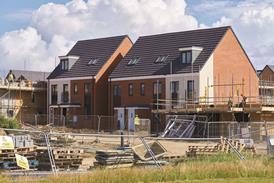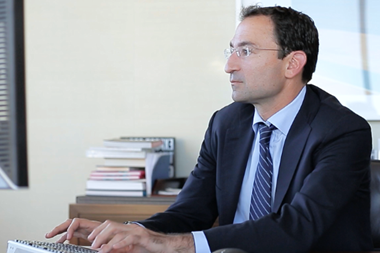At the beginning of a new year and decade, property’s leading lights reveal their hopes, expectations and resolutions for 2020 in the second of a two-part special.

Steven Charlton
Managing director, London studio, Perkins&Will
I hope to see planning reform move higher up the political agenda. For too long, our lengthy and inefficient system has made it increasingly difficult for developers to meet the diverse range of housing needs across the country.
My hope is that with the growing role of technology within the property industry, data and open-source resources will streamline the planning process, help engage and involve communities in the planning process in a more meaningful way and, ultimately, create better, more interconnected places.
Unleashing the potential of data and technology will be vital for redeveloping cities throughout the UK and I envisage architects playing a key role in guiding this process.
While we cannot be sure of what the industry will need or which technologies will emerge in the next decade, we have to adopt an approach that ensures our designs anticipate future needs within the built environment.
Adopting new technology could provide significant opportunities for development, enabling architects to design buildings that are more sustainable and future-proofed for changing consumer demand and climate impacts. I expect flexibility of design and uses to become increasingly important as urban land becomes scarcer and developers, occupants and governments look to intensify and diversify land use.

Mark Rowe
Principal, Penoyre & Prasad
After the real changes in perception and acceptance of the climate emergency that we have seen in 2019, I hope to see the translation of these new attitudes into meaningful design.
As architects and engineers, we know how to deliver net-zero-carbon in-use for buildings, which is why we launched our pledge with Perkins&Will, to produce a zero-carbon design strategy from January onwards at no additional cost to our clients.
We hope this will drive wider behavioural change from clients, government and broader society to become the norm throughout the entire industry. From this, we should be able to start tackling the difficult challenge of achieving zero embodied carbon in our projects over the next year.
I was disappointed that the climate emergency did not play a greater part in the recent election campaign. The winning Conservative manifesto made few concrete commitments in this area. The current Part L 2020 consultation document for the Future Homes Standard similarly shows little ambition to meet the necessary demands of mitigating, and adapting to, climate change.
Whether on carbon-in-use, embodied carbon or post-Grenfell fire regulation, I am concerned that we find ourselves waiting for the market to innovate where simple regulatory diktat would encourage the necessary changes. However, I remain confident that as an industry we will continue to push onwards and reach a consensus on how to do so.
Resolutions: We have already committed to produce a zero-carbon pledge at no cost for all of our clients in 2020, in partnership with Perkins&Will, but I am also determined to push for greater use of timber throughout all of our projects. It won’t end up the right choice for every project but should always be the starting point, whether CLT, engineered timber or simple timber frame.
We know that timber will play a huge role in getting us to zero embodied carbon whatever the debates around exactly how much carbon each particular strategy or product captures. I am excited to be working closely with Perkins&Will to make our net-zero-carbon ambitions a reality.
Personally, I will continue to try and eat less meat and take trains instead of planes – or better still, use Skype more.

Alex Aitchison
Director of development, Lincoln Property Company UK
Construction will commence on the first phase of Lincoln Property Company’s flagship UK project at Station Hill in Reading.
I hope we continue this momentum in delivering a transformative regeneration project at Station Hill and unlocking this key site for the town. The time for Station Hill is now and the start of a new decade feels very appropriate for such a game-changing moment for Reading.
More broadly, we remain confident in the UK market and that occupier markets will continue to hold up.
Resolutions: To keep challenging the way we do things boldly enough to ensure we bring a difference to our customers – residents, occupiers and local stakeholders. On a personal level, to prioritise wellness and take on an adrenaline-fuelled challenge.

Khevyn Limbajee
Senior political consultant, Redwood Consulting
We hope the Conservative government looks seriously at regional policies, making good on its manifesto promise to invest in left-behind towns and kickstart much-needed regeneration.
We expect there will be a tricky time post Brexit as the property industry gets to grips with the new reality. As Westminster, the Metropolitan mayors and local government all have different parties running them, we will likely see a degree of uncertainty around how to interact with the multiple layers of government.
We anticipate some contradicting messages and signals coming from those different layers, and the wider property sector will need clear guidance on how to navigate those differing streams. We expect to see a radical shake-up in central government in membership of the cabinet and the way departments are structured. No doubt there will also be increased pressure from Scotland for 10 Downing Street to grant another independence referendum.
Resolutions: To continue to provide clear counsel and guidance in navigating a highly complex planning and political landscape, demystifying a process that can at times appear baffling, and clearing a path for investment and innovation. And to save myself time, money and stress from a daily tube commute by cycling to work – even in the rain.
Continue to part 17 here
2020 vision: predictions for the year ahead
- 1
- 2
- 3
- 4
- 5
- 6
- 7
- 8
- 9
- 10
- 11
- 12
- 13
- 14
- 15
- 16
 Currently reading
Currently reading2020 vision: predictions for the year ahead (part 16)
- 17















































No comments yet